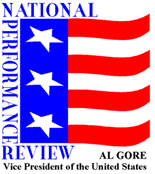Archive

REINVENTION
EXPRESS
September 25, 1996 Vol. 2, No. 20
An Information Sheet for Federal Communicators, Managers, Workers, and Their Partners--Pass It On
Vice President Gore Reveals The Best Kept Secrets in Government
Vice President Gore presented his annual report on the National Performance Review--The Best Kept Secrets in Government--to the President on September 20 in Portland, Oregon.
Many people have heard about government getting cheaper and smaller, the Vice President said in the book's introduction, but they haven't heard that government is getting better. "It's time for these secrets to get out."
"This book the Vice President gives me today," the President said, "is a book that Americans ought to be interested in. It says we're bringing common sense to government."
The book features real people--a front-line federal worker, a homemaker, a business executive, and a mayor. Their stories show that government culture is changing for the better, although there are still many things that need to be improved. The book highlights internal reforms (such as procurement), customer service, and partnerships with business and communities. The book includes appendices rich with facts and figures about savings, NPR recommendations, reinvention initiatives, and downsizing.
Oregon was selected as the site for the presentation because of that state's pioneering efforts to forge a new approach to federal-state-local partnerships.
Reinvention Highlights
The book reports the smallest workforce in 30 years, with savings of $118 billion from reinvention activities. Here's a sampling of what federal workers and their agencies are doing:
- Agriculture dropped 3 million pages of government forms.
- Commerce eliminated requirements for prior approval on over $32 billion worth of exports, and has completed the first comprehensive rewrite of Bureau of Export Administration regulations in 45 years.
- Defense will replace 27 payroll systems with one by 1997.
- Education eliminated 93 percent of its regulations. The Goals 2000 and School to Work Opportunities Act have no regulations at all.
- Energy reinvented internal management practices and initiated cost-cutting measures to save $1.7 billion.
- Federal Emergency Management Agency cut in half the time it takes for assistance to reach disaster victims.
- General Services Administration reduced its workforce by 28 percent and cut its operating costs by 21 percent.
Sorry, we're running out of space. You'll find many more examples in the book. The Best Kept Secrets in Government is on
NPR's reinvented home page at http://www.npr.gov. Look under "Latest Additions" or the "Library." You may buy the book from the Government Printing Office (Stock # 040-000-00676-1). Random House has published a version (without the appendices) that will be in book stores soon.
It's the Law: Start Reengineering Your Agency's Travel Process
President Clinton signed 1997 Defense Authorization legislation on September 23. It contains provisions for the biggest change in government travel rules in 40 years, and was passed with strong bipartisan support in the Congress.
The new law finally fixes the underlying legislative problems so that all agencies can reinvent their travel systems, one of NPR's initial recommendations. Implementation will save taxpayers hundreds of millions a year while improving government travel services. It does this by adopting the best travel practices in the private sector. The law:
- Repeals the 1939 Telephone Act, which requires that all long-distance telephone calls be certified by supervisors as being in the interest of the government.
- Eliminates senseless red tape for employees who are required to transfer to another location.
A House version of the bill required agencies to use a corporate credit card for travel expenses. Although that provision did not make the cut in conference, committee members thought the card was a good idea. The conference report urges agencies, when appropriate, to use their discretionary authority to "maximize the use of the travel charge card."
Over the years, the General Accounting Office has highlighted the excessive cost of the government's travel system. Last year it pointed out that, while the Defense Department spent about $5 billion on its travel, it spent an additional 30 percent just to administer the system. Well-run travel systems in the private sector cost about six percent to administer.
Government reinventors do not have to look to the private sector for a model. In 1995, the National Security Agency's travel management operation, a reinvention lab, was selected by Business Travel News, the newspaper of the travel industry, as one of the four best in the country. NSA is right up there with Hewlett-Packard, Bankers Trust, and Texas Instruments. NSA's new process, including software under development, can be used by other agencies. Call Chip Mahan at (301) 688-3023.
A task force of the Joint Financial Management Improvement Program, a government-wide reinvention activity, developed the new legislation and implementing regulations. Call (202) 512-9201 for the name of a task force member who can discuss the travel provisions. Call (202) 512-6000 to get a copy of the JFMIP report, Improving Travel Management Governmentwide.
The report is also on the World Wide Web. See FinanceNet (http://www.financenet.gov). The direct URL is gopher://pula.financenet.gov:70/00/docs/central/jfmip/travel.rpt.gop.gop. You may also use Gopher. To get a menu, use this address: gopher: //gopher.financenet.gov.
National Performance Review, 750-17th St., NW, Suite 200, Washington, DC 20006
To subscribe to Reinvention Express by email, send an email message to:Listproc@etc.fed.gov with this message: SUBSCRIBE EXPRESS-L FIRSTNAME LASTNAME. (Put three spaces: after the word "SUBSCRIBE," after "EXPRESS-L," and after your FIRSTNAME.) For fax distribution, send your name, organization, fax and phone number to Pat Wood, email: pat.wood@npr.gsa.gov; FAX (202) 632-0390 or phone (202) 632-0223. The Express is on NPR's home page at http://www.npr.gov. Look under "News Room."

